Introduction: In this article, Mary Harrell-Sesniak searches old newspapers to learn health and safety tips that our ancestors used to cope with the 1918 Flu Pandemic. Mary is a genealogist, author and editor with a strong technology background.
My mother used to tell me that when the flu was prevalent, her family, and her family before her, would get out of Philadelphia. That was good advice, given how virulent the outbreaks were – especially the 1918 Flu Pandemic that lasted three years and killed around 50 million people worldwide.
My family was always adamant about other procedures, most under the classification of manners, such as using napkins, not chewing with your mouth open, not putting elbows on the table, and oh yes, washing your hands with a paper towel and throwing it away. This last one may have had to do with the family working in the paper industry.
Many people do not know that the modern version of the paper towel was invented by Arthur Hoyt Scott of Scott Paper Company in 1915. Here is his patent.
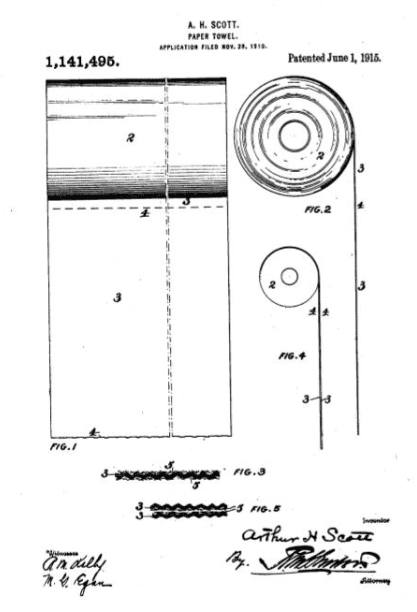
The story I heard from my mother and grandmother was that a Philadelphia teacher was concerned about her students using their clothing to wipe their noses – and that led Scott to the manufacture of the modern version of the paper towel, which also led to disposable tissues.
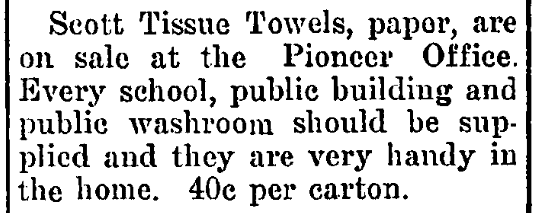
If you think about it, the practice of not using handkerchiefs or shared cloth towels may have contributed in a positive way to getting past the 1918 Flu Pandemic, which some experts believe actually began in 1917 or perhaps even earlier.
Curious as always, the current global coronavirus crisis led me to take a look in GenealogyBank’s Historical Newspaper Archives to see what was going on in 1917 regarding hand washing. There are some good lessons in these reports and, not surprisingly, much of the old-time advice still applies today.
Hand Washing Lawsuit
I’m guessing from this lawsuit, filed by Mrs. Pearl Holstoff, that handwashing was considered important. As the first female barber in New Bedford, Massachusetts, she filed for support because her husband Jacob did not wash his hands. The motion was granted and this oversight cost him $2 a week in support plus expenses.
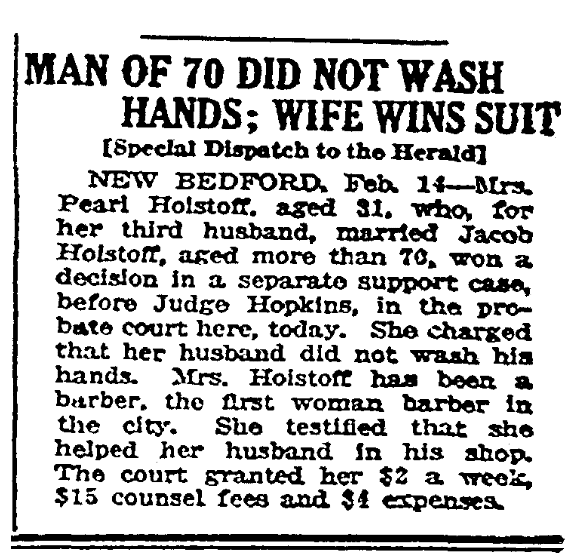
Letter to the Paper
You can also see how this trend took off by reading this letter to the newspaper in Boston. Mrs. D. E. Hayner of Cambridge, Massachusetts, preferred paper towels for cooking and cleaning because they do “away with the soiled, ugly looking roller towel.”
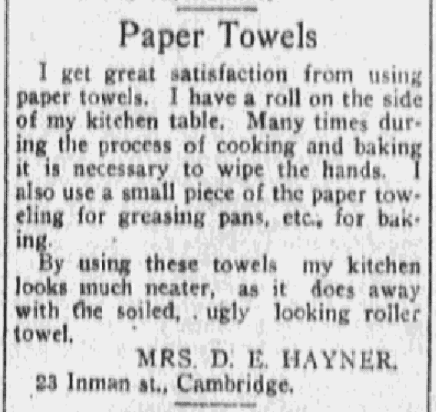
Health Tips for Students
It’s interesting that many of the health tips for students really haven’t changed.
In addition to a hearty breakfast, students had to wash their hands and face with soap at noon. If you’re like me, I’m wondering when the noontime cleansing routine stopped, and why wasn’t it also done at night. Perhaps playing and sleeping out of doors were deemed more important.
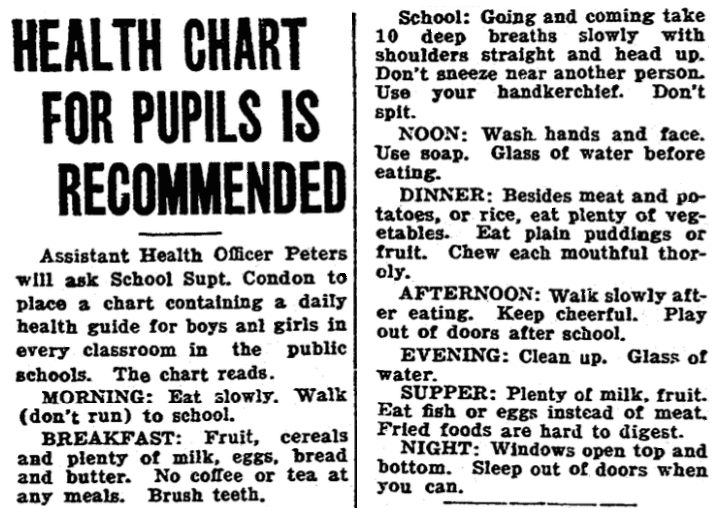
Military Rules
Among the military rules was to wash hands thoroughly before ALL meals. Bathing was only required two times a week, but preferable on a daily basis. Canteens were not to be shared, and there were cautions about ice. A stronger warning was issued about flies both for the soldiers and for the cooks.
Anyone violating these rules could find a reduction in their month’s pay.
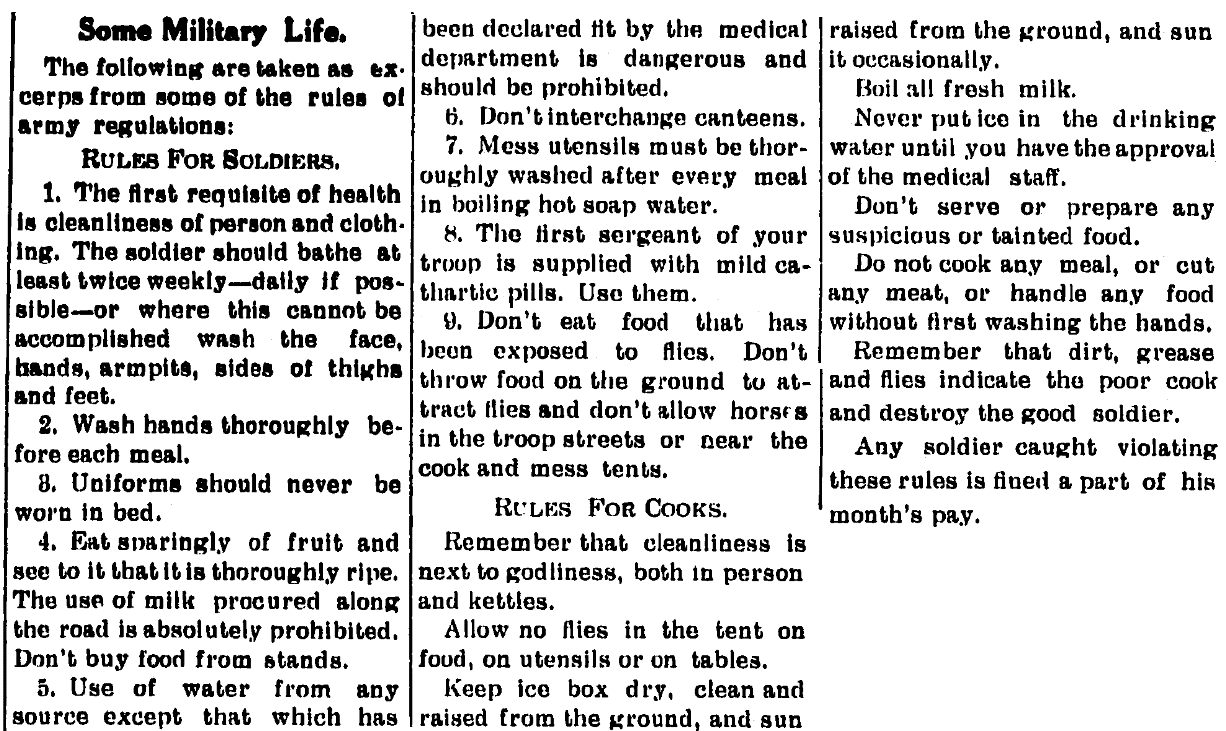
Today we shouldn’t waste or hoard paper (including emptying the shelves of toilet paper), a lesson stressed over 100 years ago as well.
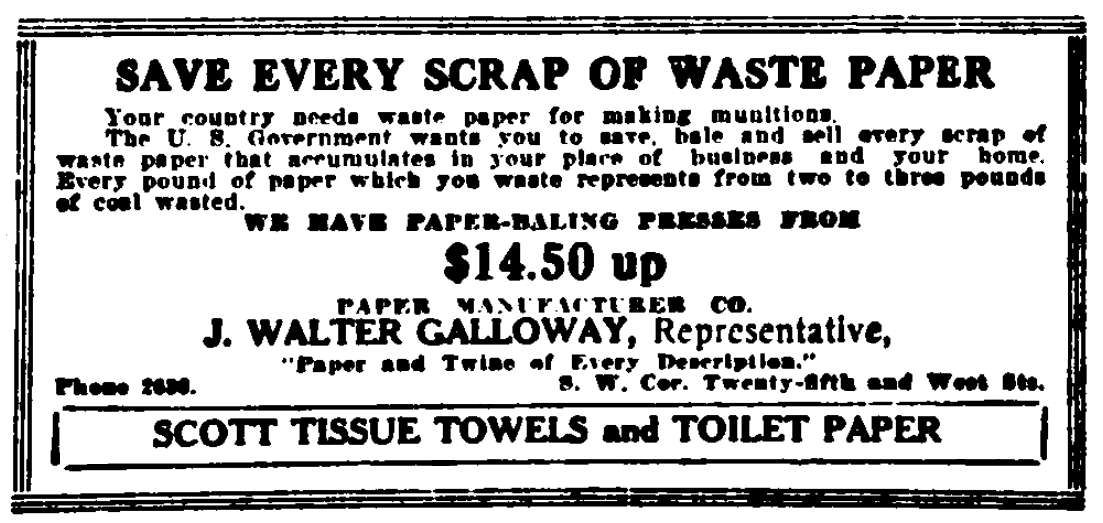
Combating the Flu
In October of 1918, with the flu raging, the Surgeon General issued these safety tips.
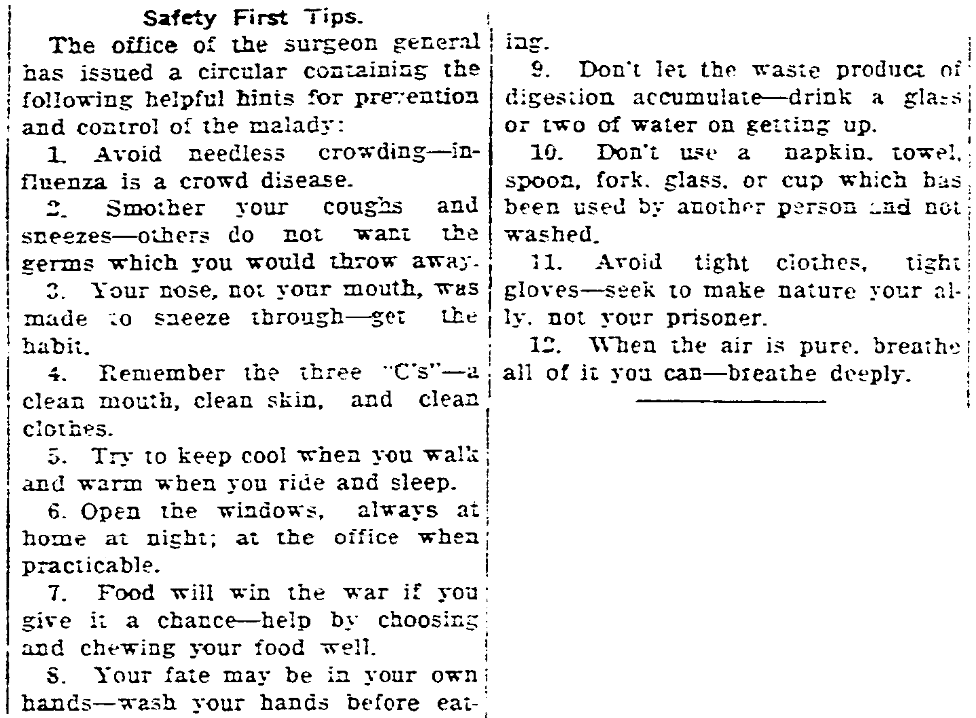
I wish everyone luck during this health crisis. Remember to wash your hands – and if it helps anyone, feel free to share this “Please touch my heart, but not my hands” collage I made using Adobe Spark.
Related Articles:

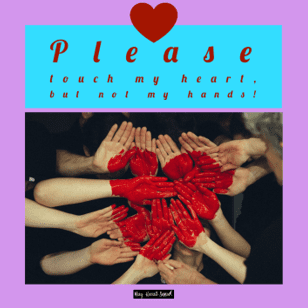
My grandparents on my dad’s side of the family died; out of five children, only my uncle and my dad made it. They were raised by their uncle. Wish I had a picture of grandma and grandpa; I do not know what they looked like. It was the Roy Hughes family. If anyone out there has a picture I would like to see it. They died in 1920.
Hi Dorothy,
Thank you for writing. That is very sad that your grandparents died in 1920. It’s often hard to find a photo, but I have some suggestions.
Network with descendants of your uncle. One may have a family photo album.
Passport applications often had photos.
Contact the local historical society and ask about photographers who worked during their lifetime.
Post on social media sites, but please include more information about the family, such as location, age, parents, etc.
Check cemetery and funeral home records. Photos are not likely, but often you’ll find clues as to other records.
One site that shares photos people find is called Dead Fred.
Lastly, don’t forget to query GenealogyBank for photos. Expand your search to include family celebrations and reunions of others.
Good luck with your search for a photo of your paternal grandparents.
Mary
The wisdom of the past helps us survive in the future.
Robert,
That is very true. Thank you for sharing.
Mary
My grandfather was a streetcar conductor in Lansing, Michigan, in 1918, a newlywed. He contracted the flu. He told his children, and my mom told me, that he bought a chicken, boiled it, ate it and drank the juice. In a week he recovered from the flu. Chicken soup is good for you!
Susan,
Thank you for sharing your chicken soup story. Good advice.
Mary
My mother was very fortunate. She and her mother survived the epidemic in 1918. Grandma had the flu and mom was ready to be born on October 25, 1918. Mom lived to be 100. She was healthy most all her life.
Barbara,
Thank you for your comments. Always nice to hear of a good outcome after getting the flu.
Mary
I grew up with my Grandmother Laura Couger Hastings, who told me about the flu of 1918. Her husband, Thomas Hastings who worked for the railroad, died of pneumonia at the onset of the disease. Their oldest son, George Hastings, died of the flu of 1918 at Ft. Pike (shows what close quarters does to spread the disease), then she lost the youngest son Sturman Hastings, age 18, just started at the University, he died in the infirmary. She explained what she did as an aide for a local doctor who took her to family after family to provide nursing care. When she got one family up to where they could take care of themselves, he would come get her and move her to the next. The good part of the story with George was that he had just gotten married before entering the service. His new wife gave his pension to Grandmother, said she was young enough to move on with her life, and the $30 a month would help her, as she had no other income, and no other son to care for her. The other children were girls and they were married with lives of their own. She was a sweet soul; everyone should be so lucky as to have such a good person to instruct them in how to live and the Christian values she instilled in me.
Dorothea,
Thank you for sharing this story. Very sad to hear of your family losses, but how nice to hear of the kindness of sharing the pension.
Mary
My grandfather died from the flu in October 1918 in Pa. He left four small boys (including my Dad), whose mother died in 1913. They were raised by an aunt in NJ. Old family story was that he tried to cure the flu it with alcohol. Never knew if that meant he was an alcoholic until I read that they were actually trying to cure it with alcohol. Shots of whiskey were being prescribed by doctors. Pharmacists were handing it out.
Helen,
Thank you for writing.
Very sorry to hear about the loss of your family members. Very interesting to hear about the whiskey prescriptions!
Mary
My stepdad, Walter Jaeger, was born in the early 1880s. He was a farm boy, growing up in Sheboygan County, WI, back then. We used to think he was a tad eccentric, as he was a “fresh air fiend,” even in Wisconsin wintertime! Opening windows even in winter to “avoid consumption,” as they then called TB. He knew that my Mom’s side of our Irish-American family was especially vulnerable to tuberculosis; she lost her mother & eldest sister, as well as her Irish-American uncle in county sanitorium — all within two years of one another. When my sister, brother and I were growing up in the 1950s, polio was still feared in the U.S. Kids were quarantined at home! But my Mom’s greatest fear was TB, as she knew & lost so many in her immediate family. All her siblings, eight kids, carried TB vulnerability. WI then had a law that kids must be scratch-tested, along with their teachers, every two years!
Den,
Thank you for sharing your story. Very sorry to hear about the TB vulnerability in your family.
Mary
REALLY GREAT ARTICLE! My parents were born in 1915 and lived through the 1918 pandemic. I was a child during the 1950s and my mother was paranoid about any public place we went and anything we touched since it was the height of the polio epidemic. Now, I totally understand the reasons for concern! This article helped me put some things together from our personal family history.
Beverly,
Glad you enjoyed my article and thank you for sharing your story.
One wonders how cautious society will be after experiencing our latest health crisis!
Mary
I am a genealogist for our family, and one relative in my family and another in my husband’s family was lost to the 1918 flu pandemic. Both were young women in the prime of life. I found your article even more interesting because of these losses! It has inspired me to chronicle in some way my own experience with the Covid-19 Pandemic. I know that 100 years from now, some future member of my family will find it interesting. Thank you for your contribution!
Katharine,
You’re welcome.
Nice to hear that you found my article interesting. I think it is wonderful to chronicle our current experiences. However, be sure to write about many parts of your life, lest future generations define you only by this time period.
Mary
My mother and her brother and sister all had the Spanish Flu. The family lived in rural southern Kansas. My mother said that she was never so sick in her life and thought that she was going to die. She was a very young child at the time. However, her parents believed her to be the least sick of the three children. Her mother went to Lawrence where her sister, the oldest sibling, was attending the University of Kansas. That sister was considered the most seriously ill. She lost all of her hair to the illness and earned the nickname “Bobbie” for the way her hair grew back. My mother’s brother was at Mexico Military Academy in Mexico, Missouri. His father went there to look after him. All three recovered and lived long lives. The older two siblings were in crowded school settings. Was each infected in those settings? My mother was on a farm in a remote part of Kansas. Did she get the virus at school, in the local small town, from her siblings, or…?
Michael,
Thank you for sharing your story about life in rural Kansas. Nice to know that your family members recovered and lived long lives.
Mary
Thanks for the interesting article. One of the most amazing things I’ve discovered since starting my tree six years ago was the history of my mother-in-law’s family. She had been raised by nuns in the San Francisco area, and knew she had a Hawaii connection, but her mother was distant and suffered some mental illness, so she really did not know much. I discovered, mainly through geneolgical records (and some family trees with common ancestors) that her grandparents both died in 1920 in Hawaii of the Spanish flu. They were barely in their 30s and her grandmother was pregnant with her fourth child when she died a week after her husband. The three orphans were tragically spread out with relatives, the boys staying in the islands and the girl, my husband’s grandmother, being sent to Catholic boarding school at age 8. This was the same school her daughter, my mother-in-law, ended up being raised in. In this case, a young, beautiful and really well-connected Hawaii couple (I did find a photo of them!) was taken at the very end of the pandemic, and the results were truly life shattering for their children. In my mother-in-law’s case, she had no idea of her family roots. Her mother’s trauma at losing her parents prevented her from being able to talk to her, raise her properly or, it would seem, have a normal life. The information I was able to find and share with my 80-ish mother-in-law, though tragic, at least helped her to understand why she always felt so alone and without family. Because of genealogy, she now knows who she is, and what an amazing family she has had all along!
Laura,
You are welcome. Glad you found the blog interesting.
Sad to hear about your family story. Nice that you were able to document it and share with you mother-in-law.
Mary
Mary, thank you for your great interest in our healing history, in which women like you shared, saved lives, and educated the youth. The aftermath of WWI is something my cousin experienced and wrote about, terrible stuff for the world. Thank you for sharing that useful healing history.
Howard,
You are welcome. Glad that you found the healing history interesting.
Mary
My Aunt, my father’s sister Gussie Safian, died of the flu in 1918 at the age of 27. She left a husband and two small children ages 3 and 4. Another Aunt who had children of her own helped raise them while their father worked and until he remarried.
Thank you for writing this article. I found it interesting because my Grandpa died in the epidemic of 1918. He was only 27, the father of six, leaving my Grandma the total caregiver. She only had a slight education, didn’t speak English, and was an only child. Her parents and inlaws were in Austria, and not planning to come to America because of the War. My Grandpa had three brothers and one sister who came over when my grandparents did. Thank God for that because then she could have some help. They lived in a small rural area in southeastern Pennsylvania. No Social Security, no welfare, no skills, so she took in washing and ironing. My mom was 4 when her Daddy died, but she could remember when it happened and how practically whole families were dying from it. Undertakers could not keep up with all the bodies. It had to be horrible! A few years later she met a man new to America who happened to be from the same area as my grandparents in Austria, although they did not know each other. They married and she had 10 children. They bought a farm, worked hard, and thankfully, no one else got sick.
Darlene,
You are welcome.
Thank you for sharing your story and especially how resilient your family is.
Mary
This is fascinating. Thank you for putting it together.
I would like this in the news more than what they have been sharing. Great job.
Jen,
You are welcome. Thank you for the kind comments.
Mary
My mother Margaret came down with the Spanish flu during the epidemic in the 1910s. It affected her heart and she was quarantined for a while. I was born in March 1938. My mother died in June 1938, so I never had a chance to know her.
Joseph,
Thank you for writing how your mother came down with the influenza and very sorry that you lost your mother at such a tender age.
Mary
My grandmother had the flu in 1918. She was pregnant with her fourth child, my mother at the time. Her doctor came to see her and when he left, he said “Goodbye. I’ll see you soon.” But as he walked down the stairs, he said “But I know I won’t.” My grandmother heard him and was so angry she claimed later it gave her the will to live. She survived, and lived to be 91. My mother was born in February 1919 and lived to be 94.
J.
Thank you for sharing this story. Sad that your grandmother overheard an insensitive remark, but happy to hear it gave her the will to live.
Mary
When searching for family, check states’ death records. For instance in Alabama, lots of soldiers died of the flu in 1918 at Ft. McClellan; therefore I am sure deaths could be in other states that family is unaware of.
My great great Aunt Jessie Bowman’s husband died in West Virginia of the Spanish flu, because he wanted to clean up and prepare his brother for burial from the flu and he caught it from him. Yes, even today a friend of mine whose husband had a kidney transplant was told by his doctors he could no longer perform cosmetic procedures for deceased people in the funeral home morgue, because he could catch a disease from the deceased person.